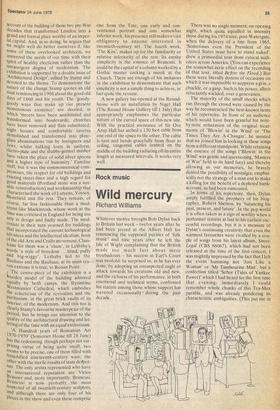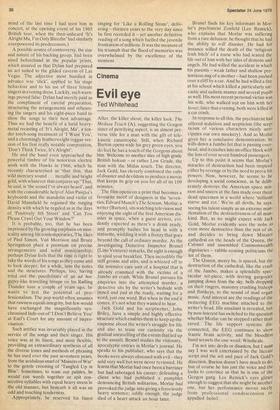Rock music
Wild mercury
Richard Williams
Whatever motive brought Bob Dylan back to Britain last week — twelve years after he had been jeered at the Albert Hall for renouncing the supposed purities of 'folk music' and nine years after he left the Isle of Wight complaining that the British made too much fuss about mere troubadours — his success at Earl's Court was twofold: he surprised us, as he has ever done, by adopting an unsuspected angle of attack towards his creations old and new, and the richness of his performance, in both emotional and technical terms, confirmed his stature among those whose support has wavered occasionally during the past decade.
There was no single moment, on opening night, which quite equalled in intensity those during his 1974 tour, post-Watergate, when the delivery of a line from 1965, 'Sometimes even the President of the United States must have to stand naked', drew a primordial roar from cynical audiences across America. (You can experience the somewhat eerie effect on the recording of that tour, titled Before the Flood.) But there were literally dozens of occasions on which it was impossible to suppress a grin, a chuckle, or a gasp. Such is his power, albeit reluctantly wielded, over a generation.
The majority of the small shocks which ran through the crowd were caused by the way he reconstructed the best-known items of his repertoire. In front of an audience which would have been grateful for noteby-note reiteration of the original treatments of `13lowin' in the Wind' or 'The Times They Are A-Changin', he insisted that we joined him in looking at these songs from a different standpoint. While retaining the essence of the songs (13lowin' in the Wind' was gentle and questioning, 'Masters of War' held to its hard fury) and thereby allowing us our memories, he bravely denied the possibility of nostalgia; emphatically not the strategy of a man out to make a killing for the benefit of a depleted bankaccount, as had been rumoured.
In terms of his repertoire, then, Dylan amply fulfilled the prophecy of his biographer, Robert Shelton, by 'balancing his past, present, and future'. In the pop world it is often taken as a sign of senility when a performer returns at last to his earliest successful recordings, but it is a measure of Dylan's continuing creativity that even the warmest favourites were rivalled by a couple of songs from his latest album, StreetLegal (CBS 86067), which had not been released at the time of the first concert. I was mightily impressed by the fact that I left the event humming not 'Just Like a Woman' or `Mr Tambourine Man', but a confection titled 'Senor (Tales of Yankee Power)' which I had heard for the first time that evening: immediately I could remember whole chunks of this Tex-Mex parable, and was already pondering its characteristic ambiguities. (This put me in
mind of the last time I had seen him in concert, at the opening event of his 1965 British tour, when the then-unheard 'It's Alright Ma, I'm Only Bleedin' had similarly overpowered its predecessors.) A possible source of controversy, the size and nature of his backing group, had been aired beforehand in the popular prints, which assured us that Dylan had prepared an act suited to the gilded caverns of Las Vegas. The adjective most bandied in advance was 'slick', applied to his stage behaviour and to his use of three female singers in evening dress. Luckily, such warnings proved false: Dylan had merely paid us the compliment of careful preparation, structuring the arrangements and rehearsing the singers and his eight-piece band to show the songs to their best advantage. Thus we had the benefit of a lurid heavymetal recasting of 'It's Alright, Ma', atender torch-song treatment of 'I Want You', and a charmingly featherweight reggae version of his first really notable composition, 'Don't Think Twice, It's Alright'.
He and the band even approached the powerful timbre of his notorious electric work with the Hawks in 1966, which he recently characterised as 'that thin, that wild mercury sound. . . metallic and bright gold, with whatever that conjures up.' That, he said, is 'the sound I've always heard', and with the considerable help of Alan Pasqua's keyboards and the -mandolin and violin of David Mansfield he regained the surging density with which he regaled us in the days of 'Positively 4th Street' and 'Can You Please Crawl Out Your Window?'
It is probable, too, that he has been impressed by the growing emphasis on musicality among his contemporaries. The likes of Paul Simon, Van Morrison and Bruce Springsteen place a premium on precise arrangements and solid musicianship; perhaps Dylan feels that the time is right to take the words of his songs as they come and to look deeper, for a while, into the notes and the structures. Perhaps, too, having
tried out the possibilities of an ad hoc
gypsy-like travelling troupe on his Relling Thunder tour a couple of years ago, he wants to test the potential of pro fessionalism. The pop world often assumes that rawness equals integrity, but few would have exchanged the magnificently synchronised fade-out of'! Don't Believe You' at Earl's Court for any amount of improvisation.
Such artifice was invariably placed in the service of the songs and their singer. His voice was at its finest, and most flexible, providing an extraordinary synthesis of all the diverse tones and methods of phrasing he has used over the past seventeen years, from the acidulous snarl of 'Masters of War' to the gentle crooning of 'Tangled Up in Blue'. Sometimes, to tease our palates, he would run words together or spit consecutive syllables with equal heavy stress in the old manner, but beneath it all was an odd and touching tenderness.
Appropriately, he reserved his finest singing for 'Like a Rolling Stone', delivering — thirteen years to the very day since he first recorded it — yet another definitive reading of a song which fuelled the juvenile frustration of millions. It was the measure of his triumph that the flood of memories was overwhelmed by the excellence of the moment.















































 Previous page
Previous page